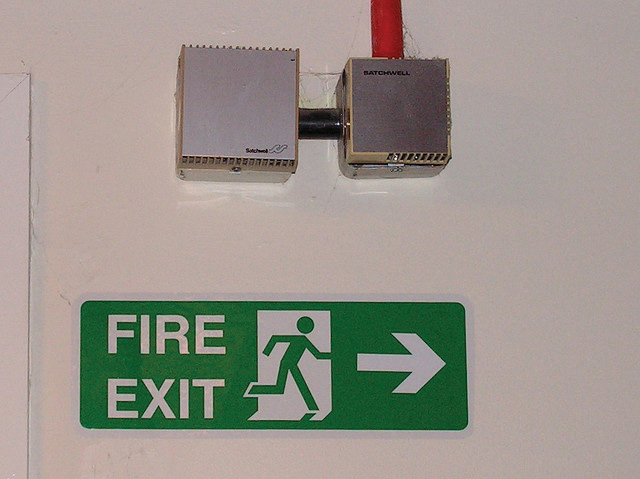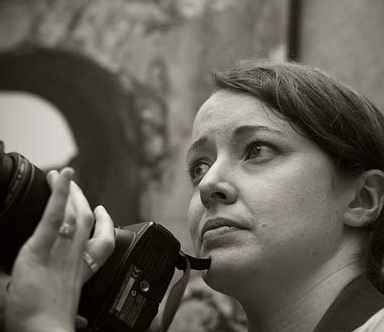This is “Case Studies”, section 5.3 from the book Business Ethics (v. 1.0). For details on it (including licensing), click here.
For more information on the source of this book, or why it is available for free, please see the project's home page. You can browse or download additional books there. To download a .zip file containing this book to use offline, simply click here.
5.3 Case Studies
The Ethics of Grunge Work

Source: Photo courtesy of ictsan, http://www.flickr.com/photos/ictsan/3025080337/.
Jason Everman (b. 1967), Kodiak, Alaska
In February 1989, Jason Everman joined a new act called Nirvana as a backup guitarist. A few months later the group’s first record, a raw and noisy effort titled Bleach, was recorded and released by an obscure local distributor.
Everman played in the 1989 summer tour supporting Bleach, then was kicked out of the band: the rest of the guys found him too showbizzy on stage and too introverted off it. Bleach scored a minor success on the college radio circuit.
Nirvana’s 1991 follow-up, Nevermind, is one of the more important and financially lucrative pieces of recorded music in history.
In 1990, Everman joined Soundgarden to play bass on their promotional tour for the EP Loudest Love. Not meshing with the other band members, he was sent packing after the tour’s end.
Soundgarden’s 1991 release Badmotorfinger scored a moderate success with the indie crowd. The 1994 follow-up, Superunknown, debuted at number one on the Billboard 200 album chart. It stayed there.
In 1994, Everman joined the US Army Rangers and then a special forces unit. He toured in Afghanistan and Iraq. He was honorably discharged in 2006.
Fifteen minutes of fame came to Everman on November 10, 2008, when he was featured in a New Yorker piece titled “Theatre of War.” While being interviewed to provide a veteran’s perspective on war, a friend of Everman’s breaks in to add that besides being a warrior, Everman had once been a musician. The article’s author was skeptical. But, she writes, later investigation revealed that Everman had, in fact, been a small-time rock star.
During the interview Everman related that he’s a devotee of the Renaissance intellectual Benvenuto Cellini, who believed that in order to live a full life, you must develop each of the soul’s three parts: the artist, the warrior, and the philosopher. At the time of the interview, Everman—bearded and heavily tattooed—was studying philosophy at Columbia University in New York City.
Kurt Cobain (b. 1967), Aberdeen, Washington
Cobain was born into a broken home and eventually lived with a born-again Christian family. He adopted the religion. The faith didn’t last; soon he was spray painting “God is Gay” onto random pickup trucks in the neighborhood.
In 1981, his uncle gave him a choice between a bike and a guitar for his birthday. He went for the guitar.
By March 1988, Cobain had formed a noisy outfit called Nirvana. They were playing dives around Seattle, doing bad covers, and making up some of their own songs. They decided to make a record. No one wanted to sponsor them. They decided to go ahead anyway and pay for it themselves. None of them had any money.
In 1989, another local musician, Jason Everman, agreed to pay the $606.17 it cost to make the record if they’d let him join the group. They did. They recorded Bleach. Though he’s named on the credits and pictured (hazily) on the cover, Everman didn’t actually play on any of the tracks. Cobain said the credit was a symbolic thanks to Everman for paying the $600 it cost to record the album. Everman never got his money back.
The group took the music on the road, and when they returned home, they kicked Everman out.
The group’s next record, Nevermind, knocked Michael Jackson’s disco sensation Dangerous off the top of the charts in January 1992.
In 1991, Cobain met Courtney Love. They did massive drugs, got married, and she got pregnant.
While revolving through detox programs and heroin binges, Cobain wrote music for the next album. In Utero debuted at number one in 1993.
In 1994, Cobain committed suicide with a shotgun. These are fragments of his note:
I haven’t felt the excitement of creating music for too many years now. For example when we’re backstage and the lights go out and the roar of the crowds begins, it doesn’t affect me the way it used to. The fact is, I can’t fool you, any one of you. It simply isn’t fair to you or me. The worst crime I can think of would be to rip people off by faking it and pretending as if I’m having 100% fun. Sometimes I feel as if I should have a punch-in time clock before I walk out on stage.
I can’t stand the thought of the self-destructive death rocker I’ve become. I don’t have the passion anymore, and so remember, it’s better to burn out than to fade away.Wikipedia, “Death of Kurt Cobain,” accessed May 16, 2011, http://en.wikipedia.org/wiki/Death_of_Kurt_Cobain#Suicide_note.
Questions
-
Consider the seven values used for ethically defining jobs: meaningful work, leisure time, money, power, prestige, comfort, and security.
- Just from what you’ve read about Everman and Cobain, which values do they share? Where do they diverge?
- Are there any values not on the list that could be added to apply to the careers of either Everman or Cobain?
-
Everman worked to live; Cobain lived to work.
- What does that mean?
- Do you think it’s true? Explain.
- Does this split also divide up the seven values used for ethically defining jobs? If not, why not? If so, what’s the split?
-
Everman is a sequencer; he wholeheartedly followed one career path, then a second, and a third. He’s a different kind of sequencer than the more standard version: a man or woman following a single main career path interrupts it to do something else (have a child, start a small company, travel around the world) and then returns to the old job.
- What’s the difference between these two kinds of sequencing in terms of the value of work and what it can give you?
- Would it be useful to have different names for these two types of sequencers, or would that be splitting hairs?
- According to Everman, Cellini believed that in order to live a full life, you must develop each of the soul’s three parts: the artist, the warrior, and the philosopher. Assuming this is true, must it necessarily involve one’s work life? Is it possible to define a full life that doesn’t include any reference to your gainful employment (in other words, is it possible to live fully without worrying about what your job is)? What values for work are implied by your response?
-
Cobain comes to believe that he’s unethically exploiting consumers.
- In what sense is he unethically exploiting consumers?
- What does Cobain’s feeling reveal about the values he associates with his work life?
- Was Cobain’s response to his perceived failure justifiable? Explain.
- Whose career would you rather have: Everman’s or Cobain’s? Why? What does that tell you about your values?
- In the career you’ve chosen for yourself (just pick one, if you haven’t), what would it mean to burn out? What would it mean to fade away?
- Is it better to burn out or fade away? Justify in terms of the values that can be attached to working life.
Cop or Drug Dealer?

Source: Photo courtesy of Todd Huffman, http://www.flickr.com/photos/oddwick/1954905403/.
Roberto Pulido, a ten-year veteran of the Boston Police Department, was arrested by the FBI and charged with protecting drug dealers, cocaine dealing, identity theft, obstruction of justice, robbery, assault and battery, and money laundering.David S. Bernstein, “Cop or Drug Dealer?,” Phoenix Boston, November 9, 2006, accessed May 16, 2011, http://thephoenix.com/Boston/News/26961-Cop-or-drug-dealer/?rel=inf.
Questions
-
What are some of the advantages to being a policeman? What are some of the advantages to being a drug dealer? Presumably, Pulido started out being an honest cop, and over the course of ten years fell (or climbed) into the illegal drug business. Can you imagine how the seven values of his work might have shifted as this transformation developed?
- Which values grew in importance?
- Which might have fallen away?
- Could any of the values have been maintained through the shift in professions?
- Officer Pulido is a career sequencer, but it’s a unique kind of sequencing because his two careers actually contradict each other. It’s not that he took time off to follow some outside interest, and it’s not that he pursued various jobs that all fit into a larger plan. He did one thing and then the opposite. Is there a sense in which he has canceled out his professional life? Explain.
-
Imagine that you are considering two career directions: joining the police academy or growing some pot in the basement and getting a start in the drug-dealing business.
- Regardless of whether you’d ever actually do it, what ethical theory (duties, rights, utilitarianism, some other) could be employed to justify the decision to go the drug route?
- What ethical theory (duties, rights, utilitarianism, some other) could you employ to justify the decision to go the police route?
- Apply Nietzsche’s theory of eternal recurrence to the cop/drug-dealer choice. You would have to choose one life and live it over and over forever. Which would you choose? Why? Does that tell you anything about what you should do with the one and only life you have?
- Doctors and pharmacists deliver powerful, addictive drugs that send waves of tremendous pleasure through the users’ bodies (and sometimes those meds result in abuse and death). So that makes three career directions that have something in common: doctor, pharmacist, street drug dealer. Now, in terms of the seven values of work, what do the jobs have in common, and where do they diverge?
-
From the newspaper report on the Pulido case, “Pulido bought a Hyde Park building where his wife began teaching dance to children—and where once a month for the next several years Pulido hosted and provided protection for drug-and-sex parties. Admittance ran from twenty to forty dollars, and narcotics were often in open use. Lap dances in the “boom-boom room” cost an additional twenty dollars. As many as one hundred people attended on a given night, including well-known felons, drug dealers, and law-enforcement officers—some in uniform.”
Compare and contrast Pulido’s wife’s job and Pulido’s. Which post is most desirable for the person valuing prestige?
- How could Pulido’s drug operation be characterized as unethical in terms of the exploitation of consumers?
-
In a sense, Pulido’s wife worked for her husband. By running a dance school out of the building where Pulido operated, she provided cover for his operation.
- How could the argument be made that she has an ethical responsibility to resign from her job by shutting down the dance classes so that her husband could no longer use the space to sell drugs?
- In ethical terms, how could she justify pretending not to know what was going on in her building once a month?
- In ethical terms, and assuming she explicitly recognizes and accepts that she’s providing space and cover for her husband’s activities, how could she justify continuing to work for his operation?
- Assuming you were a drug dealer, who would you sell to, and not sell to? Why? Does this tell you anything about how willing you might be in the future to work for an ethically challenged corporation?
Investigative Fashion Journalism

Source: Photo courtesy of Dave Bleasdale, http://www.flickr.com/photos/sidelong/4110738292/.
The blogger Dahlia (she doesn’t provide her last name) wants to invent a new career. She calls it investigative fashion journalism. In condensed and slightly altered form, here’s what she writes:
Investigative Fashion Journalism is a different kind of job. When people talk investigative journalism they think Watergate, Area 51, etc. Also, due to watching too many movies, there’s the fear that the consequences of investigative journalism include losing your job, your family, your money, and on the very rare occasion—your life. (Though last I’ve heard, the fashion journalists that I’ve admired are still very much alive.) Part of the fun is being your own detective by trying to dig up evidence, to see what the big cover up is about. I mean, how many of you were actually aware that illegal immigrants working long hours in manufacturing jobs were happy being paid minimum wage in Europe?
We love scandals. And what better scandals can you uncover than the fashion industry? I mean I know celebrity gossip is hot right now, but exposing a multi-billion dollar industry gives me a bigger high, but that’s just me. Also, by exposing the corruption like those working illegal immigrants, you can change how the industry works and perhaps enforce better practices for all current and new companies coming into the mix. If you lead by good example others will follow, right?
If local universities would offer such a program in journalism, I’d sign up for it in a heartbeat. Unfortunately, for now, I’m resolved to my fashion blog.Dahlia, “Investigative Fashion Journalism,” Dualité, July 7, 2008, accessed May 16, 2011.
Questions
- “Part of the fun,” she writes, “is being your own detective by trying to dig up evidence, to see what the big cover up is about.” Is there a connection between “fun” and meaningful work? Where does fun fit in the consideration of values to be weighed when considering a career track?
- What career-related values do you suspect light up Dahlia and, more generally, the kinds of people who try to make up jobs for themselves?
-
Ethically troubling exploitation in the fashion industry.
- Do you think she thinks there’s exploitation in the fashion industry? Where?
- If there is exploitation—if something ethically reproachable is going on—what’s her relation to that blemish? Is she guilty too? Explain.
Octomom

Source: Photo courtesy of mangpages, http://www.flickr.com/photos/mangpages/3701097713/.
In January 2009, the woman known as Octomom gave birth to octuplets. Her real name is Nadya Suleman; she’s a single mother who’d split from her husband because they were unable to have children together. She was on welfare when she conceived the children via in-vitro fertilization. She already had six young ones at home.
All her children were implanted by Dr. Michael Kamrava.
The delivery required forty-six doctors, nurses, and attendants.
In 2009, she was offered $1 million to star in a pornographic movie. She refused, but later that year she signed a contract for each of her children to earn $250 a day to star in a reality show.
Questions
- Make the ethical case that a nurse should not seek employment in the office of Dr. Michael Kamrava, even though he pays well.
- Justify a nurse’s decision to work in the office of Dr. Michael Kamrava, because he pays well.
- What alignment of work-related values may have led Nadya Suleman to reject work as a porn star but accept the role of reality TV actress (along with her many children)?
Paralegal or Lawyer?

Source: Photo courtesy of Tami Vroma, http://www.flickr.com/photos/32314864@N02/3253051215/.
Sally Kane, an attorney and writer, drew up a list comparing the practical realities of two careers, paralegal and lawyer. Here’s a summary:
Paralegal: A few months training.
Lawyer: A few years of school after college.
Paralegal: Low-cost education.
Lawyer: Law school is EXPENSIVE.
Paralegal: Earning limit under $100,000 in most markets.
Lawyer: The sky.
Paralegal: A paralegal now is pretty much a paralegal forever.
Lawyer: Working as a lawyer opens doors to other careers.
Paralegal: One of the fastest-growing careers in United States.
Lawyer: Job outlook above average.
Paralegal: Limited responsibility and stress.
Lawyer: High responsibility and stress.
Paralegal: Overtime pay.
Lawyer: If there’s work until 11 pm, you work to 11 pm.
Paralegal: Once you’ve got the job, no more school.
Lawyer: You need to keep updating your knowledge (every year, if you’re a tax attorney).
Paralegal: Shorter learning curve, and your work is routine and mundane.
Lawyer: Long learning curve, and your work is intellectually challenging and varied.
Paralegal: Cubicle.
Lawyer: Private office.Sally Kane, “Should You Become a Paralegal or Lawyer?,” About.com, accessed May 16, 2011, http://legalcareers.about.com/od/legalcareerbasics/a/paralegallawyer.htm.
Questions
-
This comparison is a list of facts. Can you go through the list and attach ethical value to the facts? In terms of what value(s) does each fact make a job more or less desirable?
- Make the ethical case that it’s better to go the paralegal route.
- Make the ethical case that it’s better to go the lawyer route.
- If you’ve developed a short list of career options, can you go through and make up a sort of career decision spreadsheet that resembles the one just constructed for lawyers and paralegals? It would list the two or three jobs you’re considering. Then one column would list the factual advantages and disadvantages of each one, things about vacation time, salary, working conditions, and so on. Finally, there’d be your unique part: the notation of which of those facts held value and importance in your life and with respect to the role you imagine work to have for you in the coming years.




